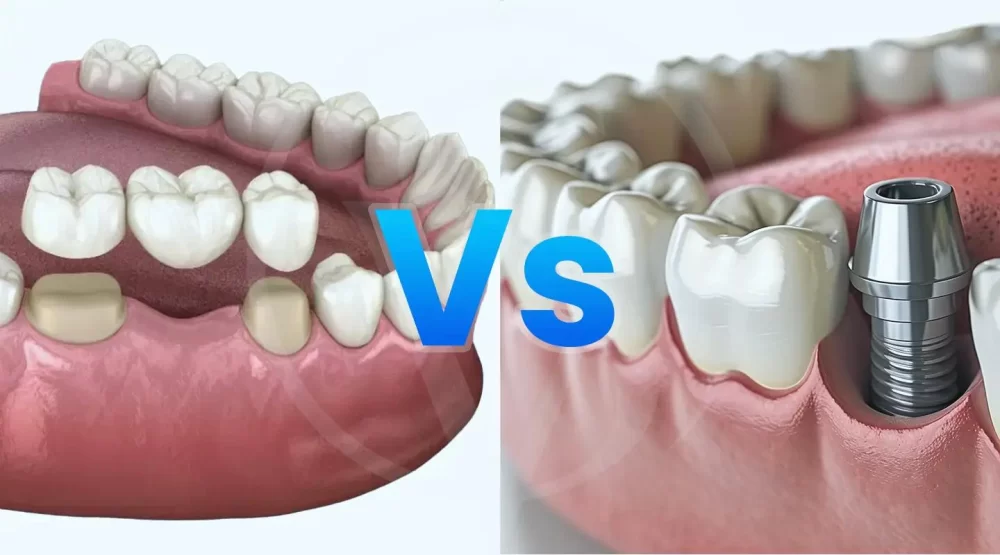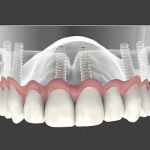
Why Choose Dental Implants Over Bridges
As someone who’s spent a lot of time thinking about dental care, I know firsthand how overwhelming it can be when faced with the decision between dental implants and bridges. For years, I struggled with missing teeth, and while there were many options available to me, choosing the right one was a real challenge. In the end, I decided to go with dental implants, and I’m here to share why I believe they’re the superior choice over dental bridges. Trust me, the difference is night and day when it comes to comfort, longevity, and overall oral health.
1. What are Dental Implants and Bridges?
Before diving into why dental implants might be the better choice, let me first explain what these two options actually are. Dental bridges are a traditional method for replacing missing teeth. They consist of one or more artificial teeth held in place by crowns on either side, which are anchored onto the neighboring healthy teeth. While they can fill in the gap of a missing tooth, dental bridges require alteration of the adjacent teeth, which can compromise their long-term health.
On the other hand, dental implants are titanium posts surgically placed into the jawbone, acting as artificial tooth roots. After the implant integrates with the bone, a crown is attached to the top. Unlike bridges, implants don’t require modifying surrounding teeth, making them a more independent and durable solution.
2. Durability and Longevity of Dental Implants
One of the major factors that made me lean towards dental implants is their exceptional durability. When I was initially considering my options, I learned that dental implants are designed to last for decades, sometimes even a lifetime with proper care. In fact, dental implants have a success rate of around 98%, making them a long-lasting solution for tooth loss. While dental bridges typically last anywhere from 5 to 15 years, they are prone to wear and tear over time, and the need for replacement or repair is much higher.
The durability of dental implants is primarily due to their ability to fuse with the jawbone in a process called osseointegration. This creates a stable and solid foundation for the implant, making it just as strong as a natural tooth. As someone who values lasting solutions, the prospect of not needing to replace my restoration in a few years was incredibly appealing.
3. The Comfort Factor: Dental Implants vs. Bridges
When I opted for dental implants, I was pleasantly surprised by how comfortable they were compared to dental bridges. With a bridge, the nearby teeth need to be filed down and reshaped to accommodate the crowns, which can lead to discomfort or sensitivity. Additionally, bridges can sometimes feel bulky or unnatural in the mouth, as they are not as stable as dental implants.
Dental implants, on the other hand, feel much more natural. Since they’re anchored directly into the jawbone, they mimic the function and appearance of real teeth. I no longer have to worry about any discomfort when eating or speaking, as the implant doesn’t shift or move around like a bridge might. This added comfort and natural feel were some of the key factors that made me choose implants over bridges.
4. Oral Health: How Implants Preserve Your Jawbone
One of the biggest reasons I chose dental implants over bridges is the impact they have on long-term oral health. When a tooth is missing, the bone in the jaw where the tooth root once was begins to deteriorate due to lack of stimulation. This is a problem that bridges cannot address, as they don’t replace the root. Over time, this bone loss can lead to facial sagging and a weakened jawbone structure.
Dental implants, however, prevent bone loss by acting as a replacement for the tooth root. The titanium post integrates with the bone, stimulating it just like a natural tooth root would. This process helps preserve the structure of the jaw and prevents bone deterioration. As I’ve learned, maintaining the health of your jawbone is crucial for maintaining overall facial aesthetics and function, and implants provide an excellent solution for this.
5. Aesthetic Considerations: Implants Look and Feel Like Natural Teeth
When it comes to aesthetics, dental implants really shine. As someone who values a natural smile, I was thrilled to discover that dental implants look and feel just like my real teeth. The crown placed on top of the implant can be custom-made to match the color, shape, and size of the surrounding teeth, ensuring a seamless blend with your natural smile.
In contrast, dental bridges may not always look as natural. While they do restore the appearance of your smile, they can sometimes appear bulky, and the crowns on adjacent teeth might be noticeable. I found that the level of customization available with dental implants makes them a far superior option when it comes to achieving a beautiful, natural look.
6. Minimal Maintenance with Dental Implants
Another significant advantage I found with dental implants is their low maintenance requirements. With bridges, there is a risk of plaque and food particles accumulating underneath the bridge, which can lead to decay or gum disease if not properly cleaned. You may also need to replace the bridge after a certain period, adding to the overall cost and inconvenience.
Dental implants require no special care beyond regular brushing and flossing, just like natural teeth. The implant’s titanium post is resistant to decay, and there’s no need to worry about the same issues that affect bridges. For someone like me, who prefers a hassle-free solution, this was a huge selling point.
7. The Cost of Dental Implants vs. Bridges
While it’s true that dental implants are generally more expensive upfront than bridges, I’ve found that the long-term benefits far outweigh the initial cost. With bridges, the need for replacements and repairs over time can add up, making them more costly in the long run. Additionally, dental implants can prevent other oral health issues, such as bone loss and gum recession, which could lead to more expensive treatments in the future.
In my case, I viewed dental implants as a worthwhile investment in my long-term health and smile. The peace of mind knowing that I wouldn’t have to deal with constant repairs or replacements was priceless.
8. The Procedure: What to Expect with Dental Implants
Having had dental implants placed, I can speak to the procedure itself. While the process takes a bit longer than getting a bridge, it’s relatively straightforward. The dentist begins by placing the titanium post into the jawbone, allowing time for the bone to fuse with the implant (a process that can take a few months). After this healing period, the crown is placed on top, and the implant is fully functional.
The procedure for dental implants is done under local anesthesia, so you won’t feel pain during the process. Post-surgery discomfort is manageable with over-the-counter pain medications, and most people experience minimal downtime. Although it requires patience, the results are well worth the wait.
In contrast, getting a bridge is typically quicker, but it may involve altering your healthy teeth, which can result in more complications down the road.
After considering all these factors, I’m confident that choosing dental implants over bridges was the best decision I could have made. From their durability and comfort to their positive impact on oral health, dental implants provide a comprehensive solution for anyone looking to replace missing teeth.







 Rollins & Petersen Orthodontics4.0 (348 review)
Rollins & Petersen Orthodontics4.0 (348 review) Audubon Dental Associates Ltd5.0 (6 review)
Audubon Dental Associates Ltd5.0 (6 review) Doc Bresler's Cavity Busters4.0 (363 review)
Doc Bresler's Cavity Busters4.0 (363 review) Smileawhile Dental4.0 (159 review)
Smileawhile Dental4.0 (159 review) Montclair Perio & Implant Specialists: Anne Hartnett, DDS0.0 (0 review)
Montclair Perio & Implant Specialists: Anne Hartnett, DDS0.0 (0 review) Dr. Shubha Soni-Gaur5.0 (1 review)
Dr. Shubha Soni-Gaur5.0 (1 review) The Importance of Oral Health Education During Pregnancy for a Healthy Pregnancy
The Importance of Oral Health Education During Pregnancy for a Healthy Pregnancy Best Tips for Brushing Your Teeth Properly for Healthy Gums: Essential Techniques for Oral Health
Best Tips for Brushing Your Teeth Properly for Healthy Gums: Essential Techniques for Oral Health Why Skipping Dental Checkups Can Lead to Bigger Oral Health Problems
Why Skipping Dental Checkups Can Lead to Bigger Oral Health Problems Advantages of Porcelain Dental Restorations
Advantages of Porcelain Dental Restorations How Can Diabetes Cause Tooth and Gum Problems? Preventing and Managing Oral Health Issues
How Can Diabetes Cause Tooth and Gum Problems? Preventing and Managing Oral Health Issues Healthy Habits for Promoting Good Oral Health and Hygiene: Tips for a Healthy Smile
Healthy Habits for Promoting Good Oral Health and Hygiene: Tips for a Healthy Smile